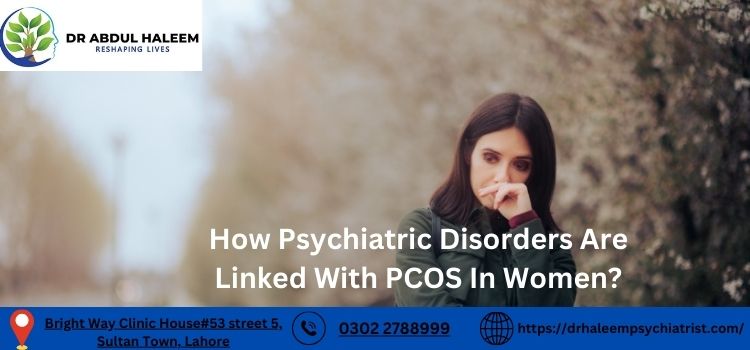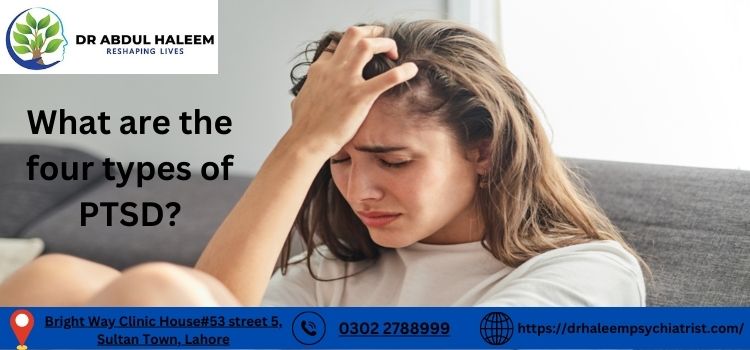Polycystic Ovary Syndrome (PCOS) is a common endocrine disorder that affects women of reproductive age. Research has indicated that women with PCOS are more susceptible to psychiatric disorders, including depression, anxiety, and bipolar disorder. So many people may have queries about How Psychiatric Disorders Are Linked With PCOS In Women.
Here, we will discuss the physiological and psychological mechanisms that may explain this link.
Read more to get further details.
How Psychiatric Disorders Are Linked With PCOS In Women?

Women with PCOS often experience not only the physical symptoms associated with the condition, such as irregular menstrual cycles or infertility but also a heightened risk for various psychiatric disorders.
This intricate relationship between PCOS and mental health issues stems from a combination of hormonal imbalances, insulin resistance, and inflammation—all hallmark features of PCOS. These changes can influence neurotransmitter function, affecting mood and cognitive function.
Physiological Mechanisms
The link between PCOS and psychiatric disorders can partly be explained by physiological mechanisms such as hormonal imbalances. Women with PCOS often have elevated levels of androgens, which can contribute to mood disturbances.
Insulin resistance, a common feature of PCOS, can also influence brain function and mood regulation, potentially leading to increased risks of depression and anxiety. Furthermore, chronic inflammation associated with PCOS may play a role in the development of mood disorders.
Its detail is given below:
Hormonal Imbalances
One of the primary factors connecting PCOS and psychiatric disorders is hormonal imbalance. Women with PCOS typically experience elevated levels of androgens, insulin resistance, and irregular menstrual cycles, all of which can significantly impact mood and emotional well-being. These hormonal changes can lead to increased levels of stress, irritability, and mood swings, which are often observed in individuals suffering from depression and anxiety.
Insulin Resistance
Another link between PCOS and mental health disorders is insulin resistance. Insulin resistance, a common characteristic of PCOS, has been associated with an increased risk of developing mood disorders. This resistance can contribute to weight gain and obesity, further exacerbating feelings of low self-esteem and anxiety, ultimately affecting mental health. Understanding this physical link is crucial for developing comprehensive treatment plans for women suffering from both PCOS and psychiatric disorders.
Inflammation
Chronic inflammation is another physiological factor that may connect PCOS with psychiatric disorders. In women with PCOS, higher levels of inflammatory markers have been observed, which may contribute to the development of mood disorders. Inflammation can impact the brain by altering neurotransmitter activity, potentially leading to symptoms of depression and anxiety. Additionally, inflammation may exacerbate other symptoms associated with PCOS, such as weight gain and insulin resistance, creating a cycle that negatively affects mental health.
Psychological Mechanisms
Besides physiological aspects, psychological mechanisms also play a significant role in linking PCOS with psychiatric disorders. Women with PCOS often face challenges related to their self-image, fertility issues, and societal perceptions of body image, all contributing to mental distress.
The chronic nature of PCOS symptoms, such as acne, unwanted hair growth, and weight gain, can lead to social withdrawal, low self-esteem, and increased vulnerability to depression and anxiety. Addressing these psychological components is critical in providing holistic care to those suffering from both PCOS and psychiatric disorders.
Self-Image and Societal Pressures
Women with PCOS often grapple with self-image issues due to the physical manifestations of the syndrome, such as hirsutism, acne, and weight gain. These symptoms can significantly impact self-esteem and body image, contributing to a negative self-perception. In addition to self-image struggles, societal pressures, and beauty standards can exacerbate feelings of inadequacy and isolation.
The constant comparison to societal ideals can lead to a cycle of negative thoughts and emotions, further heightening the risk of depression and anxiety. Interventions that promote body positivity and self-acceptance can be beneficial in mitigating these psychological challenges.
Fertility Concerns
Fertility issues associated with PCOS also pose substantial emotional strain. Many women with PCOS face difficulties in conceiving, which can lead to feelings of frustration, grief, and a sense of loss. The emotional toll of fertility treatments and the uncertainty about the future can contribute to ongoing stress and mental health challenges.
Supportive counseling and therapeutic interventions aimed at addressing fertility-related emotional concerns can play a crucial role in improving the mental well-being for women dealing with PCOS.
Step Towards Holistic Treatment
Given the multifaceted nature of PCOS and its impact on mental health, a holistic approach to treatment is essential. This involves not only addressing the physical symptoms but also considering the psychological and emotional aspects of the disorder. Integrated care involving healthcare providers across endocrinology, psychiatry, and psychology can help in developing personalized treatment plans.
Lifestyle interventions, such as diet and exercise, along with medical and psychological support, are crucial for managing both PCOS and its psychiatric associations. Recognizing and validating the complex experiences of women with PCOS is key to fostering resilience and promoting overall health.
Conclusion
In conclusion, many people ask about How Psychiatric Disorders Are Linked With PCOS In Women. The intricate relationship between PCOS and psychiatric disorders necessitates a comprehensive, multidimensional approach to care. Addressing hormonal imbalances, insulin resistance, and inflammation alongside the psychological stressors of self-image and fertility enhances the management of PCOS-related mental health challenges.
Healthcare providers must work collaboratively to integrate medical, lifestyle, and psychological strategies tailored to the individual needs of women with PCOS. By embracing a holistic perspective, it is possible to improve overall well-being, empower individuals to manage both physical and emotional symptoms effectively, and ultimately enhance their quality of life.
FAQs
Some of the frequently asked questions by people are mentioned below:
Can PCOS cause mood swings and depression?
Yes, Polycystic Ovary Syndrome (PCOS) can indeed cause mood swings and depression. The hormonal imbalances associated with PCOS, such as elevated levels of androgens and insulin resistance, can significantly impact a woman’s mood and emotional state.
What psychiatric disorders are associated with PCOS?
Women with PCOS have been found to have a higher prevalence of psychiatric disorders compared to the general population. Commonly associated psychiatric disorders include depression, anxiety, and bipolar disorder.


